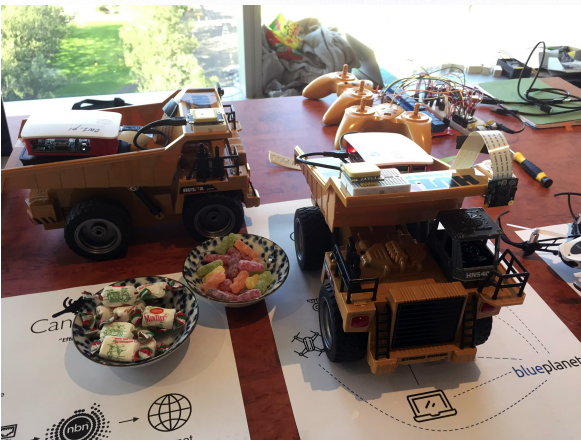Students bound for Silicon Valley after creating an automated mine safety tool

A team of University of Melbourne students have won a trip to Silicon Valley with their creation of an automated tool to improve mine safety in the University’s extended-form hackathon, AutoHack18.
Designed using Ciena’s Blue Planet software, four teams presented their solutions at last night’s grand final event, each aiming to leverage the potential of automation and make a positive difference in people’s lives.
Judged by experts from the University of Melbourne’s Networked Society Institute, Ciena and NBN Co for their innovation, benefit to society, commercial and practical viability, examples included a smart car parking solution, a wearable baby health monitor and an application to support homeless people.
The winning team, Openworks, including Felicity Chun, Kyaw Min Htin, Simone James and Anton Tarasenko, developed Canary Reporting, a tool that automates reporting of near miss mining incidents between vehicles.
As first prize, the team will visit Silicon Valley for five days courtesy of Ciena in April.
Ciena Managing Director for Australia and New Zealand and AutoHack18 Judge Matthew Vesperman congratulated the team on this outstanding achievement.
“Using Blue Planet to develop innovative and intelligent applications, Openworks have created an application that will improve mine safety,”Mr Vesperman said.
“We look forward to hosting the team during their visit to Silicon Valley where they will hear first-hand how our Blue Planet software enables service providers to develop a smarter and programmable network to effectively deploy and manage an application such as the one they have developed.”
Networked Society Institute Deputy Director and AutoHack18 Judge Ken Clarke said the AutoHack18 experience has provided a unique learning opportunity for students.
“Over the past two months, teams have moved beyond an idea into execution, reflecting the challenges and difficulties faced within the world,” Mr Clarke said.
“Through collaboration and engagement, students have been able to devise innovative ideas that show how automation can deliver positive social impact.”
The second-placed team, TOT-BOT, made up of Farzad Khodadadi, Carine Lim, Anu Sabu, and Nicholas Sujecki, created a wearable baby patch that monitors heart rate and temperature, providing an innovation solution to automated parenting. As second prize they will visit NBN Co in Sydney.
NBN Co General Manager, Programmable Networks in Chief Technology Office and AutoHack18 Judge Carolyn Phiddian congratulated students on bringing together a diverse set of experiences and applying them to real problems.
“This supports the skills that are key to future productivity and competitiveness in in the rapidly evolving connected world,” Ms Phiddian said.
The grand final also provided an opportunity for the public to have their say, with TOT-BOT picking up the People’s Choice award.
For more information, visit: networkedsociety.unimelb.edu.au